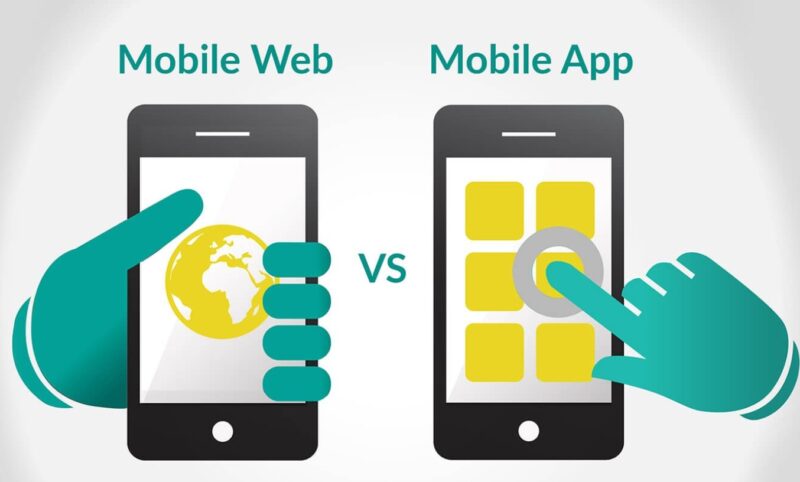Both mobile apps and mobile websites are instrumental in your overall marketing strategy. But in a world filled with so many digital channels, it can be tough to decide which one is best for your business. That’s why we created this mobile app vs mobile website guide. In it you’ll find some of the major pros/cons of each in the hopes you can make an informed decision.
What is the difference between a mobile website and a mobile app?
Mobile websites and mobile applications are oftentimes confused with one another simply because they both make use of a mobile device to show or store information. In actuality, they are both very different.
The primary difference between a mobile website and a mobile app is the intended audience. A mobile website is an approach used to create a web presence designed to be accessed via smartphones and other mobile devices, traditionally by browsing a website using a mobile device’s web browser. Mobile sites work on different types of phones, tablets & computers regardless of what kind of operating systems they use.
Mobile apps on the other hand are native applications that run inside of a dedicated software ‘container’ on your phone, tablet or watch. Click here to learn more. Apps are typically made using specific programming languages and usually provide more enhanced features than websites, such as the ability to interact with the device hardware such as the camera or GPS system.
In terms of user experience, research shows that people like native apps best. But at the same time, they spend significantly more time on the mobile web, making it critical to develop an app-like experience of your site.

Pros and cons of mobile apps vs mobile website
We are living in a mobile world. Already, smartphones have overtaken computers as the most popular means to access the Internet. And it’s important to know that traffic coming from mobile devices has already surpassed desktop visitors.
Recently, mobile applications have become more popular than standard mobile websites. The biggest advantage of using Mobile Apps is that it gives you a direct connection with the customer. You have a marketing channel to connect with customers in your pocket. Delivering a good ROI, Mobile App helps to build user engagement and hence conversion rate. It makes the life easier for the users who are on-the-go and need some information right now where they are not able to access the desktop or laptop, but it limits the visibility of your site in search engines.
Also, another con of having a mobile app would be that you are paying more money on top of what it already costs to maintain a website, which you could use towards your business as well.
Mobile websites are optimised for mobile use, meaning they provide a user-friendly experience by displaying content in an easily-accessed manner on a smaller screen. They also make optimal use of popular mobile search engines and directories. This means they are perfect when it comes to search engine optimisation, compared to mobile apps.
Also, unlike a mobile app that involves extra expenses. According to Michael Foley, CEO of New Zealand’s OpenHost, you don’t have to build another website. As long as you have a reliable web hosting provider that can provide the performance you need, you can simply optimise your existing website so that it is responsive, or you can design the same content and make the same functionality work for both.
Mobile websites are easier to build than mobile apps. Plus, mobile app testing can be expensive. However, because mobile websites run on browsers, their security is a concern.

Which is the better option?
A Mobile App and a Mobile Website are both effective marketing tools that can bring you business, so which is better? Make sure you understand the pluses and minuses of each option before making your decision.
Assuming that everyone who will use your website prefers to use a mobile version, choose mobile app. If it’s just 1 percent of users who prefer that option or if you can’t identify any prospects who are eagerly awaiting the release of your app, choose a mobile website instead.
The purpose of a mobile app is to better engage customers and bring in more revenue for businesses. Creating an app can also boost the SEO rankings of your website. App design is very important to maximize the potential of your app. In this article, I am going to show you some common mistakes that businesses make when building their app or mobile website.
The difference between a mobile app and a mobile website is that the former runs on the device itself while the latter is accessed via the internet. With a mobile app, you can do pretty much everything you can with a mobile website – as long as it has been built with everything in mind and optimized for every experience at hand.
It’s up to you whether to put resources into developing both versions of your product or just go long with one of them, but building both would be like having two of something that could potentially get in each other’s way.

Final thoughts
As at 2019, there were more than 8.3 billion mobile subscribers worldwide, and a whopping 32% of those people are using their phones to do online searches. If you’re not optimising your website for mobile devices (think smartphone and tablet), you’re missing out on a huge chunk of your target audience. As the number of mobile searches continues to increase it can be important to have your business’s mobile presence primed for that audience.
The good news is that you can get started by making your website responsive or creating one from scratch if you don’t already have. But if you can afford to, there is nothing stopping you from taking things a step further by creating a mobile app for your business. You can have both a mobile app and a responsive website to capture every single one of your target audience.
So, whether you’re a startup with limited resources or a large company with multiple platforms to target, it’s essential that mobile development is a major priority for your marketing and product teams. With the rapid growth of mobile these days, even blogs are getting in on the act of building apps to reach more people.
 Comeau Computing Tech Magazine 2024
Comeau Computing Tech Magazine 2024




